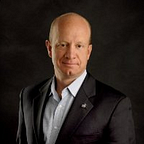Personal Branding First, Thought Leadership Second
How to personally brand yourself for the better
Influencer is a word that many associate strongly with the rise of social media platforms and their stars.
Most people my age can name a few of these new-age influencers, like the Kardashians or Paris Hilton. Web-savvy folks under 30 almost certainly have a wider range of names they associate with the term. Prior to social media, influencers were found elsewhere; Oprah comes to mind for TV influencing especially.
What all influencers have in common is their ability to leverage an effective personal brand.
The influencers I mentioned above certainly have their own convictions and ideas to spread, but they gained notoriety because they learned to use their brand to sell and boost other brands. That’s not a bad thing, as it is very normal to use recommendations from others to inform purchases. However, I believe that it is a more worthwhile pursuit to seek thought leadership from influencers versus seeking brand empowerment.
In fact, I think everyone should seek to understand their own personal brand and mine their own experiences for ways in which they can positively influence others.
Just to be clear, this is not a call to race one another to a million Twitter followers or see if you can sell out a stadium for self-help seminars. More power to you if that is a side-effect of your own self-discovery.
“I don’t need a personal brand.”
It’s a common sentiment for most folks outside of networking-heavy industries, and a wrong one at that. Everyone has a personal brand whether they like it or not! It is the way in which you are perceived by others and the way you act around others. It is the keywords that someone would use to describe you.
Personal branding takes this a notch further. If you are still of working age and thinking of getting a new job anytime soon, personal branding is more than the color on your business card; it is the process of remedying the perception others have of you and focusing it for your own benefit.
If you struggle to understand your own brand, write down the words you feel describe yourself and then ask your friends and family what they think of you. It may be awkward if there are big differences, but you can then try to find ways to improve yourself so those positive self-perceptions stick out more. Maybe you need to be more positive in conversation or change your posture. There might be something positive about yourself that you did not realize and can learn to lean into that more as well. If you have an accurate idea of what others think of you, you’re in good shape.
Keep this personal brand in mind for job interviews and networking. It’s as easy as being able to say “I’m a reliable teammate and always up for a joke or two” without “umms” or pauses thrown in. In some industries it can be helpful to even make a website for yourself to showcase work accomplishments and have a mobile way to show off your personality.
Influencers have “selling my personality” down to a science because it is their entire livelihood. Your stakes are likely a bit smaller, but there is never harm in having at least a few words or catchphrases in the back of your mind that represent a marketable version of yourself.
Thought leadership is the next level beyond having a personal brand.
Once you have the personal branding nailed down, you can decide how you can use it to impact others.
What do you want to say?
There are many different avenues you can take if you choose to start sharing your life and experiences with the world. If you want to show people the places you’ve been or the brands you like, that’s perfectly fine. Jokes and opinions are totally acceptable sharing material as well. If you want to share your political views, I wish you the best of luck.
Regardless of your content choices, I challenge you to try and find the value in what you say. What about your experiences can you use to teach others and enrich their life? How can people learn to value what you say?
Your friends would love to know what you are up to regardless of if you “influence” them per se, but are there ways to talk about your life that may perk them up a bit more? Maybe you got a new job and want to tell others about it. You can enrich that story with anecdotes about what you learned at the previous job.
Personally, I try to add value with every post I write here. It could be cathartic to write journals about the life I’ve had leading businesses, traveling, and being a father, however I always try finding the elements of a story that may be of use to someone else. Not every anecdote I have is overflowing with life-changing advice, but I feel good knowing that I at least try to offer some thoughtful perspective if I happen to influence someone else.
The best influencers rarely become sought after by brands because they are just good salespeople, they become popular because they lean into their values and become thought leaders first. Understand your brand, understand your values, and you’ll be a thought leader in no time.
Aaron Webber is a serial entrepreneur and CEO of Webber Investments LLC, as well as a Managing Partner at Madison Wall Agencies.
